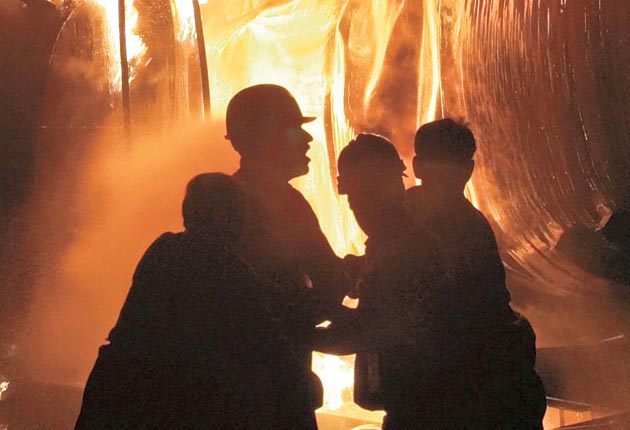Nato supply line hit by another Taliban attack on fuel tankers

The Pakistani Taliban yesterday claimed responsibility for setting fire to more than a dozen oil tankers carrying fuel for Nato troops in Afghanistan.
The attack on the convoy in the garrison town of Rawalpindi where Pakistan's army is headquartered is the latest in a series by militants and "would continue until the supplies are completely stopped", said Azam Tariq, a spokesman for the group.
It was the fourth such attack on a Nato convoy since Pakistan shut down the Khyber Pass crossing in apparent protest over a series of airstrikes by Nato helicopters in Pakistani territory, including one that killed three Pakistani soldiers. The shutdown left lorries parked and vulnerable to attack. Before dawn yesterday, a dozen attackers sprayed the vehicles with automatic gunfire. Four people were killed as the trucks were then set ablaze. A further two trucks were in flames hours later.
Later, a suspected US drone strike killed eight militants of German nationality in north-west Pakistan, Pakistani intelligence officials said. They died when two missiles from a suspected CIA pilotless aircraft struck a mosque in Mirali in North Waziristan, the officials added.
Meanwhile, both Pakistan and Nato were trying to repair the rift that had opened between them since the killing of the Pakistani soldiers. In Brussels, Nato's secretary general Anders Fogh Rasmussen issued an apology, saying that the helicopter attack was "unintended... there is a joint investigation under way," Mr Rasmussen added. "We will determine what happened, and draw the right lessons."
He said he hoped that the route would soon be reopened. Hussain Haqqani, Pakistan's ambassador to Washington, said that it would. The Pakistanis have started to play down the shutting of the Khyber Pass, arguing that the trucks could no longer flow because of a "security risk".
Sceptical observers said that yesterday's attack was proof that the risks had only been heightened by shutting the route.
In Pakistan, the killings of the soldiers has angered the country's politicians and media. Some parliamentarians demanded that sterner action be taken. The Pakistani military jealously guards its sovereignty, and reacts sharply to any unauthorised crossing of the country's borders, even by allies. In the past, it has opposed a US ground incursion. However, Pakistan is willing to allow the CIA to operate drone strikes in its tribal areas, but no further.
While the shutdown has slowed the flow of supplies into Afghanistan, Nato officials say that the effect on military operations has been negligible. Even as Pakistan closed the Khyber Pass crossing, the other route, through Chaman in Baluchistan, remained open.
Pakistan offers no protection to the Nato route. The responsibility is left to the military alliance to secure what is the cheapest route. Convoys crossing from Pakistan bring fuel, military vehicles, spare parts, clothing and other non-lethal supplies for foreign troops.
As lorries snake from Karachi, up through Sindh province, Punjab, and then across the north-west, they make frequent stops. The slow-paced journey usually takes several days and the lorries are vulnerable to attack. Lorry drivers' organisations concede that they sometimes slip hefty bribes to militants as a means of staving off attacks.
After previous attacks, Nato had chalked out plans for an alternative "northern corridor". But nothing has materialised, probably because of the high costs involved.
Join our commenting forum
Join thought-provoking conversations, follow other Independent readers and see their replies
0Comments